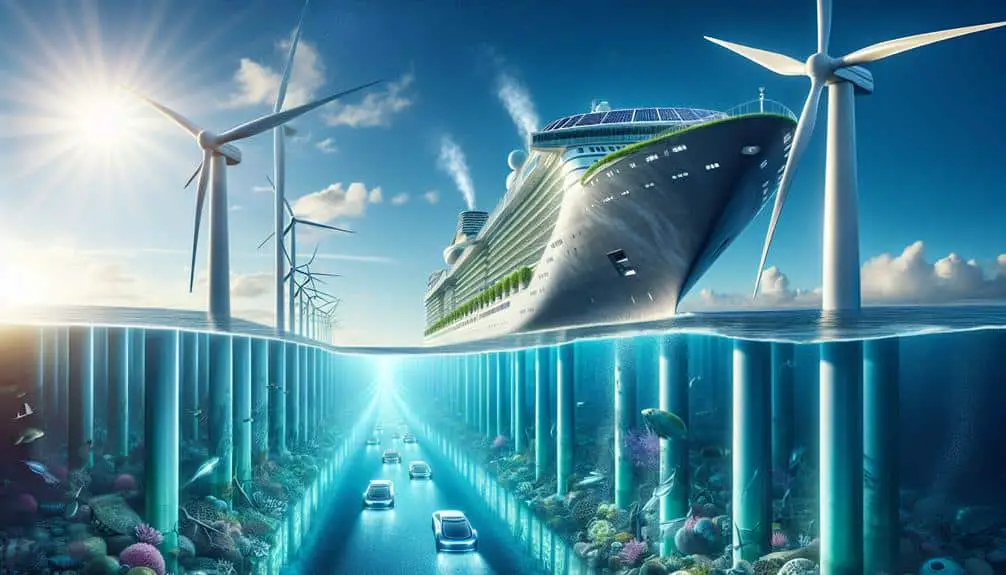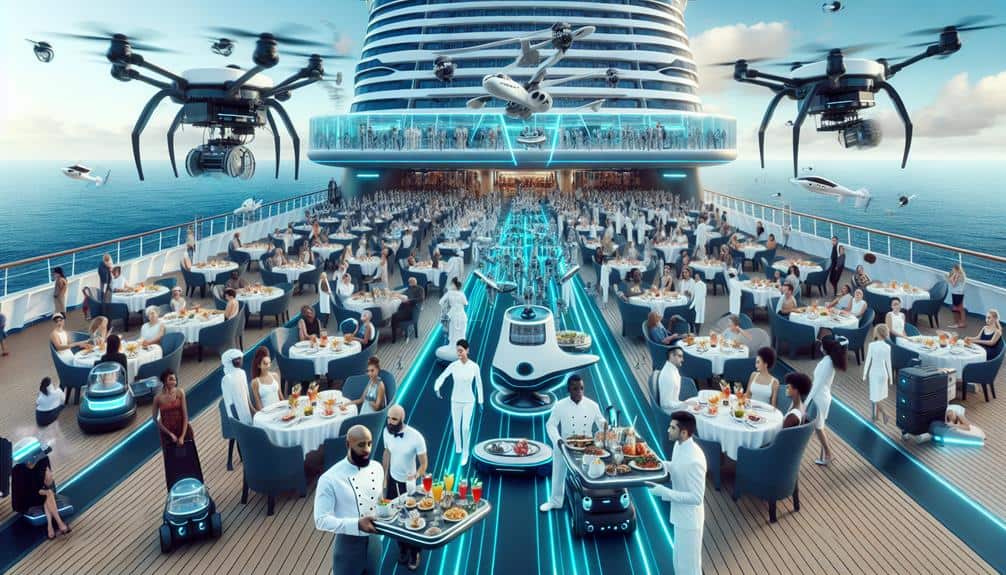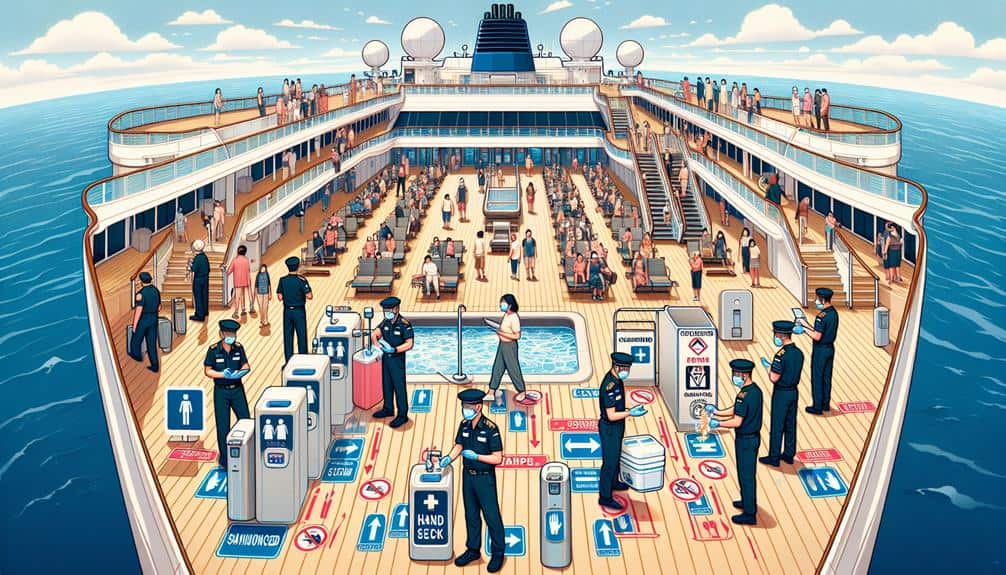You should focus on eco-friendly ship designs, alternative fuels, waste management, community engagement, and sustainable shore excursions for current sustainable cruise industry trends. Innovations include sustainable materials, LNG engines, and air lubrication systems. Implementing alternative fuel sources like biofuels and hydrogen fuel cells is pivotal. Waste management initiatives and recycling programs onboard help reduce environmental impact. Engaging with local communities and forming partnerships is key for sustainability. Developing sustainable shore excursions that prioritize environmental conservation and cultural immersion is a growing trend. These trends reflect the industry's commitment to a more sustainable future.
Key Points
- Adoption of LNG engines and hybrid technologies for energy efficiency.
- Implementation of alternative fuels like biofuels and hydrogen cells.
- Emphasis on waste management and recycling initiatives onboard.
- Engagement with local communities and partnerships for sustainability.
- Development of sustainable shore excursions focusing on conservation.
Eco-Friendly Ship Design Innovations
Incorporating sustainable materials and energy-efficient technologies into ship design is essential for reducing environmental impact in the cruise industry. By focusing on energy efficiency, cruise lines can greatly decrease their carbon footprint. Advanced propulsion systems, such as LNG engines and hybrid technologies, are being implemented to enhance energy efficiency and minimize emissions. These innovations not only reduce fuel consumption but also help in meeting stringent environmental regulations.
New hull designs, like air lubrication systems and streamlined shapes, contribute to improving the overall energy efficiency of cruise ships. By reducing drag and increasing hydrodynamic performance, these design features optimize fuel usage and lower greenhouse gas emissions. Additionally, the use of lightweight materials in construction further enhances the vessel's energy efficiency by reducing the power needed for propulsion.
Alternative Fuel Sources Implementation
The implementation of alternative fuel sources is pivotal in advancing sustainability efforts within the cruise industry. As the industry aims to reduce its carbon footprint, utilizing alternative fuels is essential. One important trend is the adoption of liquefied natural gas (LNG) as a cleaner alternative to traditional marine fuels. LNG offers improved fuel efficiency and emits fewer pollutants, contributing to lower greenhouse gas emissions.
Moreover, cruise lines are exploring biofuels derived from renewable sources like algae or used cooking oil. These biofuels have the potential to further decrease carbon emissions and enhance sustainability. Additionally, some companies are investing in hydrogen fuel cells as a promising alternative fuel option for the future. Hydrogen fuel cells produce electricity through a chemical reaction, emitting only water and heat, thereby reducing harmful emissions.
Waste Management and Recycling Initiatives
Implementing effective waste management and recycling initiatives is key to elevating sustainability practices within the cruise industry and further reducing environmental impact. Cruise lines are increasingly implementing composting programs to reduce organic waste. These programs involve collecting food scraps, paper products, and other biodegradable items to create nutrient-rich compost that can be used in landscaping or donated to local farms. By diverting organic waste from landfills, composting programs help minimize greenhouse gas emissions and promote a more circular economy within the industry.
In addition to composting programs, cruise lines are embracing circular economy initiatives by implementing robust recycling systems onboard. These initiatives focus on maximizing the reuse and recycling of materials such as plastics, glass, and metals. By prioritizing recycling efforts, cruise lines not only reduce the amount of waste sent to landfills but also conserve valuable resources and energy. Embracing composting programs and circular economy initiatives demonstrates a commitment to sustainable waste management practices and sets a positive example for the entire cruise industry.
Community Engagement and Local Partnerships
Engage with local communities and forge partnerships to enhance sustainability practices in the cruise industry. Local empowerment and cultural preservation are crucial aspects of community engagement and local partnerships within the cruise industry. By collaborating with local stakeholders, cruise lines can better understand the needs and values of the communities they visit, leading to more sustainable practices.
Local empowerment involves working hand in hand with community members to create initiatives that benefit both the environment and the local population. This can include supporting local businesses, investing in infrastructure improvements, and providing educational opportunities for residents.
Cultural preservation is another essential component of community engagement. Cruise lines can help preserve local traditions, languages, and heritage by incorporating cultural experiences into their itineraries and supporting initiatives that aim to safeguard cultural practices.
Sustainable Shore Excursions Development
To enhance sustainability practices in the cruise industry, consider developing sustainable shore excursions that prioritize environmental conservation and local community engagement. When designing these excursions, it's important to focus on conservation efforts and responsible tourism to guarantee a positive impact on the destinations visited. Here are three key elements to keep in mind:
- Local Ecosystem Preservation: Prioritize excursions that contribute to the preservation of the local ecosystem, such as marine life protection programs or coastal clean-up initiatives.
- Cultural Immersion: Offer excursions that provide opportunities for passengers to engage with local communities in a respectful and meaningful way, supporting responsible tourism practices.
- Educational Experiences: Develop excursions that educate passengers on the importance of conservation efforts and sustainable practices, fostering a greater understanding of the environmental challenges faced by each destination.
Frequently Asked Questions
How Do Cruise Lines Address the Impact of Their Operations on Marine Wildlife and Ecosystems?
When addressing the impact on marine wildlife and ecosystems, cruise lines implement marine conservation efforts and eco-friendly practices. They prioritize wildlife protection and sustainable tourism by collaborating with scientists, using advanced technologies, and adhering to strict environmental regulations.
What Measures Are Being Taken to Reduce the Carbon Footprint of Cruise Ships Beyond Alternative Fuel Sources?
To reduce the carbon footprint of cruise ships beyond alternative fuel sources, industry leaders focus on enhancing energy efficiency through innovative green technology. This approach aligns with sustainable practices and contributes to environmental preservation.
How Do Cruise Lines Ensure the Proper Disposal of Waste Generated on Board Their Ships?
To guarantee proper waste management onboard, cruise lines implement advanced recycling systems, enhancing environmental impact. By segregating waste and utilizing onboard treatment facilities, they achieve high recycling rates, with some ships diverting over 60% of waste from landfills.
How Are Cruise Lines Working With Local Communities to Support Sustainable Tourism Practices?
To support sustainable tourism practices, cruise lines collaborate with local communities through community partnerships. They engage in eco-friendly initiatives, promoting local engagement. By working together, they guarantee the preservation of environments and cultures for future generations.
What Steps Are Being Taken to Ensure That Sustainable Shore Excursions Benefit Both the Environment and Local Communities?
To guarantee sustainable shore excursions benefit both the environment and local communities, prioritize community engagement and environmental conservation. Sustainable tourism practices can lead to economic empowerment, creating a positive cycle of support for all involved stakeholders.




